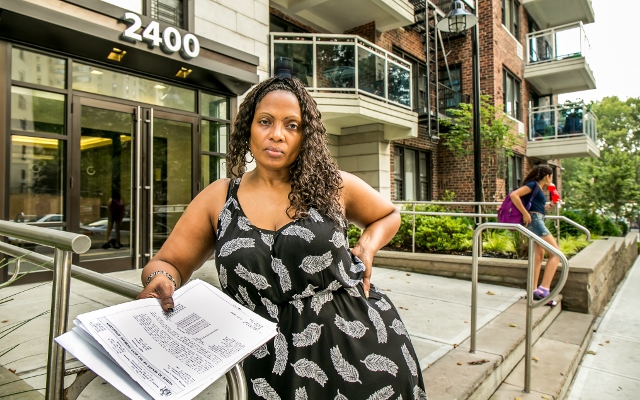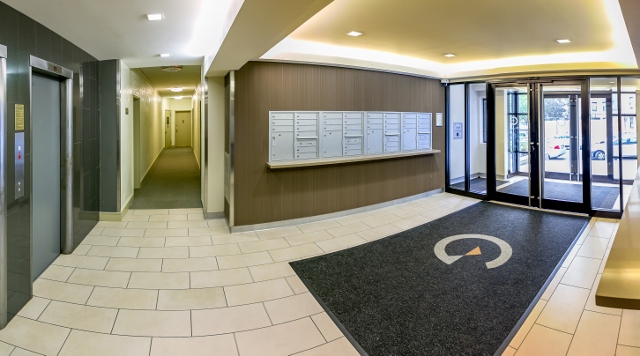
Photo by Adi Talwar
By DAVID CRUZ
The exterior of 2400 Webb Ave., an eight-story building tucked behind Fordham Hill Oval Cooperative, showed significant signs of improvement. New terraces, a high-tech intercom system and modern mailboxes were welcome enhancements for residents.
But tenants may collectively foot the bill, totaling $3.4 million, through a Major Capital Improvement (MCI), a policy that passes the costs of upgrades of general spaces to tenants. If approved, some tenants could be on the hook for as much as $500 more monthly rent, according to notices mailed in March. Tenants admit any proposed MCI rent exceeds their budgets, and are now reconsidering their stay there despite the building’s condition.
On a wider scale, the MCI, officials and tenants assert, is part of a systemic pattern of underhanded tenant abuse by the building’s landlord–Goldfarb Properties, a real estate firm with 12 properties across the Bronx. The firm’s true intentions, Webb Avenue tenants argue, is to drive them out, a suspicion powered by the removal of fire escapes in that same building three years ago. The firm filed for an MCI under review by the Division of Housing and Community Renewal (DHCR), a state agency that rejects or approves MCIs. Goldfarb Properties, through its representative, has denied the allegations, calling them “false and unfounded.”
“As with all of our properties, the building-wide improvements are based on the needs of each individual property,” said the representative via a statement.
The firm also insists that DHCR will only increase the rent by six percent each year, as per rules.
Webb Avenue tenants have since considered legally challenging the MCI rent, according to Senator Gustavo Rivera, whose district includes the property. His office also coordinated counsel for the tenants. They’ve also met with tenants from other buildings owned by Goldfarb Properties, holding closed-door meetings with the New York Attorney General’s Tenant Harassment Prevention Task Force arranged by Senator Jeff Klein, representing most of eastern Bronx. The task force is now investigating whether Goldfarb Properties breached tenants’ rights.
“We said ‘okay, this is another test, a challenge that we have to fight and beat this back,'” said Michael Stanton, president of Webb Avenue’s Tenant Association. “If [they’re] able to impose that significant increase, it’s going to mean…a lot of people are going to find other places to live.”

Photo by Adi Talwar
System-wide Issues
At the meeting, Webb Avenue tenants were joined by residents of 2160-2166 Matthews Ave., a seven-story building in Pelham Parkway. Tenants there dealt with a stream of inconveniences that included inoperable elevators, which many suspected were shut down to deliberately root them out. This led to tenants, some infirm, using stairs. .
Three tenants would die while service stopped, including one who fell down the stairs while using a walker. Another sickly tenant would stay confined to his apartment, refusing to walk down the stairs. He would later pass away, not knowing he had lung cancer. Judith Bratnick, a Matthews Avenue tenant leader, went so far as to allege that inoperable elevator service led to their deaths.
“You’re building on improvements,” said Klein of landlords. “But you don’t inconvenience tenants where the tenants can’t even live in their own apartments, or use the building or its services.”
In 2012, Webb Avenue tenants were uprooted after Goldfarb Properties hired construction crews to detach the building’s fire escapes to upgrade them. This prompted the FDNY to issue a vacate order. Tenants made accommodations to live elsewhere, using cash vouchers provided by Goldfarb Properties.
Rent Increase
In its MCI filing, Goldfarb Properties requested Webb Avenue tenants pay $85 more per room inside their individual apartment. Bathrooms, dining and living spaces were categorized as rooms, according to MCI notices Webb Avenue tenants received. Those living in apartments in the building’s spacious D line would face a $500 increase.
“I am very, very suspicious of any rent that goes up $250 to $500 as they’re reported in this building,” said Rivera.
The Webb Avenue residence is home to marginally middle class, rent-regulated tenants, who pay a preferential rent below $2,500. Some tenants have inched close to that threshold, potentially compromising their rent status should an increase take effect. State laws allow landlords to impose market rate rents if an apartment’s current rent exceeds $2500, signaling a deregulated apartment. But come Oct. 1, the threshold will increase to $2700, following the passage of the state’s rent protection laws in June.
An empty unit can be even more advantageous. Vacancy bonuses clear landlords into raising rents upwards of 20 percent once a unit becomes available. Klein said he suspects Goldfarb Properties have played a game in forcing out tenants to fast track bonuses. He’s since drafted legislation barring landlords from benefitting off any vacancy bonus should they be convicted of tenant harassment.
For his part, Rivera sees MCIs as largely problematic, and has introduced legislative reforms of the MCI process, which he considers a “perverse incentive” for landlords. But tenants are entitled to contest any MCI application to the DHCR, who reviews written complaints and renders a decision.
“To me it seems like it’s a way for a landlord who owns a building to get various improvements so they don’t need to pay them,” said Stanton. “It’s just a way for them to say, ‘Let me fix my building, I can put them on the back of the residents.’”
Future of the Bronx
The Webb Avenue residence lies on the outskirts of Kingsbridge, a neighborhood that’s seen a number of real estate transactions happen since developers announced the construction of the Kingsbridge National Ice Center. The center, to be built at the Kingsbridge Armory, is pegged as a harbinger of a resurging Bronx. But it has also sparked talk of gentrification, becoming a touchstone topic in recent years, as landlords hedge their bets in luring more high-income earners in place of the marginalized. For Goldfarb Properties, the firm said the KNIC project had “no bearing” on fixing 2400 Webb, planned since 2011.
An even bigger argument has been that with a more attractive Bronx, tenant harassment may indeed increase in the long-term, with landlords exploiting vacancy bonuses to fast track the deregulation of an apartment.
Regardless of the borough’s future, tenants are reconsidering staying where they are. Ada Sanchez, a social worker and mother, is unsure where she’ll live after Aug. 31. After reviewing her finances, Sanchez realized $500 more in rent would be too much. “Not that the MCI’s not important,” she said, “but technically I have no place to live come August.”





You can’t have it both ways. Improvements cost money. You can either let buildings fall apart – or pay more.
To the previous comment, the residents clearly understand that you can’t have it both ways. The problem is when you have a building that is not in need of repair and you generate improvements just to take advantage of a quirk in the state law. The law is completely unjust because it gives landlords their money back several times over because these increases are permanent.
Michael Staton President 2400 Webb Ave Tenants Association.